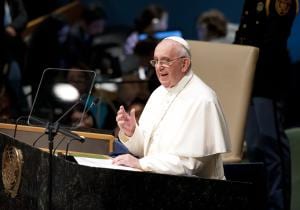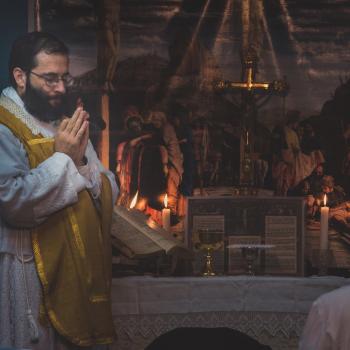Today, Pope Francis released Fratelli Tutti. I read it all today. As I read through I highlighted lines I liked and added them in order to this big file as a kind of mid-sized summary fo the document. Fratelli Tutti was a little harder to summarize than many other papal documents so this ended up about 15% the length of the Encyclical and split into two parts (part two). I try to provide as much direct quotation as possible to give you a summary that is as unfiltered by my perspective and directly what the Pope wants everyone to hear. I hope you find this helpful.

Introduction
A summary of St. Francis’s mission to the Sultan: “Francis did not wage a war of words aimed at imposing doctrines; he simply spread the love of God. He understood that ‘God is love and those who abide in love abide in God’ (1 John 4:16). In this way, he became a father to all and inspired the vision of a fraternal society. Indeed, ‘only the man who approaches others, not to draw them into his own life, but to help them become ever more fully themselves, can truly be called a father.'” 4
A kind of thesis statement for the whole encyclical: “It is my desire that, in this our time, by acknowledging the dignity of each human person, we can contribute to the rebirth of a universal aspiration to fraternity. Fraternity between all men and women.”8
Chapter One: Dark Clouds over a Closed World
This introduces a repeated theme in Chapter 1: the need to see others as brothers & sisters over enemies: “For decades, it seemed that the world had learned a lesson from its many wars and disasters, and was slowly moving towards various forms of integration.” 10
A reminder that we are called to improve the world. “It is not possible to settle for what was achieved in the past & complacently enjoy it, as if we could somehow disregard the fact that many of our brothers & sisters still endure situations that cry out for our attention.” 11
The issue of an overly individualistic culture: “Local conflicts and disregard for the common good are exploited by the global economy in order to impose a single cultural model. This culture unifies the world, but divides persons and nations, for ‘as society becomes ever more globalized, it makes us neighbours, but does not make us brothers.’We are more alone than ever in an increasingly massified world that promotes individual interests and weakens the communitarian dimension of life.” 11
History teaches us lessons: “There is a growing loss of the sense of history, which leads to even further breakup. A kind of ‘deconstructionism,’ whereby human freedom claims to create everything starting from zero, is making headway in today’s culture. The one thing it leaves in its wake is the drive to limitless consumption and expressions of empty individualism.” 13
I, unfortunately, see this kind of political polarization by those in both major US political parties: “The best way to dominate and gain control over people is to spread despair and discouragement, even under the guise of defending certain values. Today, in many countries, hyperbole, extremism and polarization have become political tools. Employing a strategy of ridicule, suspicion and relentless criticism, in a variety of ways one denies the right of others to exist or to have an opinion.” 15
Hope for a better political situation: “Amid the fray of conflicting interests, where victory consists in eliminating one’s opponents, how is it possible to raise our sights to recognize our neighbours or to help those who have fallen along the way?” 16
A real call out for the protection of the elderly, poor, unborn, and disabled: “Some parts of our human family, it appears, can be readily sacrificed for the sake of others considered worthy of a carefree existence. Ultimately, ‘persons are no longer seen as a paramount value to be cared for and respected, especially when they are poor and disabled, “not yet useful” – like the unborn, or “no longer needed” – like the elderly. We have grown indifferent to all kinds of wastefulness, starting with the waste of food, which is deplorable in the extreme.'” 18 (whole paragraph)
Our (lack of) care for the elderly shows how we give individualism pre-eminent value: “A decline in the birthrate, which leads to the aging of the population, together with the relegation of the elderly to a sad and lonely existence, is a subtle way of stating that it is all about us, that our individual concerns are the only thing that matters.” 19
“Poverty must always be understood and gauged in the context of the actual opportunities available in each concrete historical period.” 21 For example, today lack of clean water & electricity is rightly considered poverty while these wee lacking through much of history.
A reminder that things like the UN’s Universal Declaration of Human Rights contain Catholic values: “By closely observing our contemporary societies, we see numerous contradictions that lead us to wonder whether the equal dignity of all human beings, solemnly proclaimed seventy years ago, is truly recognized, respected, protected and promoted in every situation.” 22
Our uneven society shows where we have room to grow regarding human rights: “While one part of humanity lives in opulence, another part sees its own dignity denied, scorned or trampled upon, and its fundamental rights discarded or violated. What does this tell us about the equality of rights grounded in innate human dignity?” 22
“War, terrorist attacks, racial or religious persecution, and many other affronts to human dignity are judged differently, depending on how convenient it proves for certain, primarily economic, interests.” 25 For example, why have few nations condemned the Armenian Genocide or the current persecutions (Uighurs, Christians, Muslims, etc.) in China.
We should try to see the beauty in all the humans we live together with. “We increasingly sense that ‘the gap between concern for one’s personal well-being and the prosperity of the larger human family seems to be stretching to the point of complete division between individuals and human community… It is one thing to feel forced to live together, but something entirely different to value the richness and beauty of those seeds of common life that need to be sought out and cultivated.'” 31
Best one-liner so far: “All too quickly, however, we forget the lessons of history.” 35
Francis condemns extreme policies on immigration: “No one will ever openly deny that they [immigrants] are human beings, yet in practice, by our decisions and the way we treat them, we can show that we consider them less worthy, less important, less human. For Christians, this way of thinking and acting is unacceptable, since it sets certain political preferences above deep convictions of our faith: the inalienable dignity of each human person regardless of origin, race or religion, and the supreme law of fraternal love.” 39
This is the first time in a significant document that any Pope has indicated the “right to privacy” exists. “Oddly enough, while closed and intolerant attitudes towards others are on the rise, distances are otherwise shrinking or disappearing to the point that the right to privacy scarcely exists. Everything has become a kind of spectacle to be examined and inspected, and people’s lives are now under constant surveillance. Digital communication wants to bring everything out into the open; people’s lives are combed over, laid bare and bandied about, often anonymously. Respect for others disintegrates, and even as we dismiss, ignore or keep others distant, we can shamelessly peer into every detail of their lives.” 42
“They [digital relationships] lack the physical gestures, facial expressions, moments of silence, body language and even the smells, the trembling of hands, the blushes and perspiration that speak to us and are a part of human communication.” 43 I think these have some value but we should not completely devalue digital friendships.
The problem of today’s world being too self-focused: “The ability to sit down and listen to others, typical of interpersonal encounters, is paradigmatic of the welcoming attitude shown by those who transcend narcissism and accept others, caring for them and welcoming them into their lives.” 48
“God continues to sow abundant seeds of goodness in our human family.” 54. We need to constantly have hope like Pope Francis.
Chapter Two: A Stranger on the Road
Much of this chapter is based around the parable of the Good Samaritan.
The common rights of mankind are not just abstract legal principles: “The Book of Job sees our origin in the one Creator as the basis of certain common rights: ‘Did not he who made me in the womb also make him? And did not the same one fashion us in the womb?’ (Job 31:15). Many centuries later, Saint Irenaeus would use the image of a melody to make the same point: ‘One who seeks the truth should not concentrate on the differences between one note and another, thinking as if each was created separately and apart from the others; instead, he should realize that one and the same person composed the entire melody.'” 54
Old testament often limited concerned to co-nationalists. The New Testament makes this universal: “In the New Testament, Hillel’s precept was expressed in positive terms: ‘In everything, do to others as you would have them do to you; for this is the law and the prophets’ (Matthew 7:12). This command is universal in scope, embracing everyone on the basis of our shared humanity, since the heavenly Father ‘makes his sun rise on the evil and on the good’ (Matthew 5:45).” 60
No matter how much we are honored members of society, we need to care for the common good. “Jesus tells the story of a man assaulted by thieves and lying injured on the wayside. Several persons passed him by, but failed to stop. These were people holding important social positions, yet lacking in real concern for the common good. They would not waste a couple of minutes caring for the injured man, or even in calling for help.” 63
“Let us admit that, for all the progress we have made, we are still ‘illiterate’ when it comes to accompanying, caring for and supporting the most frail and vulnerable members of our developed societies. We have become accustomed to looking the other way, passing by, ignoring situations until they affect us directly.” 64
A reminder that we are all called to love each other. “The parable [of the Good Samaritan] clearly does not indulge in abstract moralizing, nor is its message merely social and ethical. It speaks to us of an essential and often forgotten aspect of our common humanity: we were created for a fulfilment that can only be found in love. We cannot be indifferent to suffering; we cannot allow anyone to go through life as an outcast. Instead, we should feel indignant, challenged to emerge from our comfortable isolation and to be changed by our contact with human suffering. That is the meaning of dignity.” 68
A harsh but real summary of the parable of the Good Samaritan: “Once confronted by the painful sight of the poor man on the roadside. The distinctions between Judean and Samaritan, priest and merchant, fade into insignificance. Now there are only two kinds of people: those who care for someone who is hurting and those who pass by; those who bend down to help and those who look the other way and hurry off.” 70
We are often more like the priest & Levite than the Good Samaritan. “The parable then asks us to take a closer look at the passers-by. The nervous indifference that makes them pass to the other side of the road – whether innocently or not, whether the result of disdain or mere distraction – makes the priest and the Levite a sad reflection of the growing gulf between ourselves and the world around us. There are many ways to pass by at a safe distance: we can retreat inwards, ignore others, or be indifferent to their plight. Or simply look elsewhere, as in some countries, or certain sectors of them, where contempt is shown for the poor and their culture, and one looks the other way, as if a development plan imported from without could edge them out. This is how some justify their indifference: the poor, whose pleas for help might touch their hearts, simply do not exist. The poor are beyond the scope of their interest.” 73
We are all called to change the world. “Each day offers us a new opportunity, a new possibility. We should not expect everything from those who govern us, for that would be childish. We have the space we need for co-responsibility in creating and putting into place new processes and changes. Let us take an active part in renewing and supporting our troubled societies.” 77
“He [Jesus] asks us not to decide who is close enough to be our neighbour, but rather that we ourselves become neighbours to all.” 79 Christian charity does not restrict itself to one kind of person.
Chapter Three: Envisaging and Engendering an Open World
Love for others powerfully renews us. “In the depths of every heart, love creates bonds and expands existence, for it draws people out of themselves and towards others. Since we were made for love, in each one of us ‘a law of ekstasis’ seems to operate: ‘the lover “goes outside” the self to find a fuller existence in another.’ For this reason, ‘man always has to take up the challenge of moving beyond himself.'” 88
Moral virtues need to be infused with charity. “People can develop certain habits that might appear as moral values: fortitude, sobriety, hard work and similar virtues. Yet if the acts of the various moral virtues are to be rightly directed, one needs to take into account the extent to which they foster openness and union with others. That is made possible by the charity that God infuses. Without charity, we may perhaps possess only apparent virtues, incapable of sustaining life in common.” 91
“Love, then, is more than just a series of benevolent actions. Those actions have their source in a union increasingly directed towards others, considering them of value, worthy, pleasing and beautiful apart from their physical or moral appearances. Our love for others, for who they are, moves us to seek the best for their lives.” 94
“Love… impels us towards universal communion.” 95
We need to include the disabled: “I would like to mention some of those ‘hidden exiles’ who are treated as foreign bodies in society. Many persons with disabilities ‘feel that they exist without belonging and without participating.’ Much still prevents them from being fully enfranchised. Our concern should be not only to care for them but to ensure their ‘active participation in the civil and ecclesial community.'” 98
Mere respect for liberty is insufficient: “Fraternity is born not only of a climate of respect for individual liberties, or even of a certain administratively guaranteed equality. Fraternity necessarily calls for something greater, which in turn enhances freedom and equality.” 103
Human dignity is intrinsic, not based on circumstances: “Social friendship and universal fraternity necessarily call for an acknowledgement of the worth of every human person, always and everywhere. If each individual is of such great worth, it must be stated clearly and firmly that ‘the mere fact that some people are born in places with fewer resources or less development does not justify the fact that they are living with less dignity.'” 106
Repeating the last paragraph but about disabilities rather than birthplace: “Every human being has the right to live with dignity and to develop integrally; this fundamental right cannot be denied by any country. People have this right even if they are unproductive, or were born with or developed limitations. This does not detract from their great dignity as human persons, a dignity based not on circumstances but on the intrinsic worth of their being.” 107
109 is rather wordy but reminds us to respect the disabled whatever their economic status: “Some people are born into economically stable families, receive a fine education, grow up well nourished, or naturally possess great talent. They will certainly not need a proactive state; they need only claim their freedom. Yet the same rule clearly does not apply to a disabled person, to someone born in dire poverty, to those lacking a good education and with little access to adequate health care. If a society is governed primarily by the criteria of market freedom and efficiency, there is no place for such persons, and fraternity will remain just another vague ideal.”
Immorality and superficiality are enemies of Christian ethics. “We have had enough of immorality and the mockery of ethics, goodness, faith and honesty. It is time to acknowledge that light-hearted superficiality has done us no good. Once the foundations of social life are corroded, what ensues are battles over conflicting interests.” 113
Virtue starts at home: “Families are the first place where the values of love and fraternity, togetherness and sharing, concern and care for others are lived out and handed on.” 114
Focus on the rights of all over the priveledges of a few. “The world exists for everyone, because all of us were born with the same dignity. Differences of colour, religion, talent, place of birth or residence, and so many others, cannot be used to justify the privileges of some over the rights of all.” 118
Lessons from two Fathers of the Church: “Not to share our wealth with the poor is to rob them and take away their livelihood. The riches we possess are not our own, but theirs as well.” -St. John Chrysostom. “When we provide the needy with their basic needs, we are giving them what belongs to them, not to us.” -St. Gregory the Great 119
The Church affirms private property but doesn’t make it absolute. “The Christian tradition has never recognized the right to private property as absolute or inviolable, and has stressed the social purpose of all forms of private property.” 120
Working and building wealth is not a sin, instead, it can be part of a vocation. “Business activity is essentially ‘a noble vocation, directed to producing wealth and improving our world.’ God encourages us to develop the talents he gave us, and he has made our universe one of immense potential. In God’s plan, each individual is called to promote his or her own development, and this includes finding the best economic and technological means of multiplying goods and increasing wealth.” 123
“The right to private property is always accompanied by the primary and prior principle of the subordination of all private property to the universal destination of the earth’s goods, and thus the right of all to their use.” 123
We should seek for all people to have necessities of life. “If we accept the great principle that there are rights born of our inalienable human dignity, we can rise to the challenge of envisaging a new humanity. We can aspire to a world that provides land, housing and work for all.” 127
Chapter Four: A Heart Open to the Whole World
A balanced view that prefers all countries developing but recognizes that migration is sometimes preferable: “Ideally, unnecessary migration ought to be avoided; this entails creating in countries of origin the conditions needed for a dignified life and integral development. Yet until substantial progress is made in achieving this goal, we are obliged to respect the right of all individuals to find a place that meets their basic needs and those of their families, and where they can find personal fulfilment. Our response to the arrival of migrating persons can be summarized by four words: welcome, protect, promote and integrate.” 129
Immigration enriches us: “The arrival of those who are different, coming from other ways of life and cultures, can be a gift, for ‘the stories of migrants are always stories of an encounter between individuals and between cultures. For the communities and societies to which they come, migrants bring an opportunity for enrichment and the integral human development of all.'” 133
A globalized world makes us all interconnected: “We need to develop the awareness that nowadays we are either all saved together or no one is saved. Poverty, decadence and suffering in one part of the earth are a silent breeding ground for problems that will end up affecting the entire planet. If we are troubled by the extinction of certain species, we should be all the more troubled that in some parts of our world individuals or peoples are prevented from developing their potential and beauty by poverty or other structural limitations. In the end, this will impoverish us all.” 137
Don’t empty local cultures of their important values! But don’t forget wider connections either.“An innate tension exists between globalization and localization. We need to pay attention to the global so as to avoid narrowness and banality. Yet we also need to look to the local, which keeps our feet on the ground. Together, the two prevent us from falling into one of two extremes. In the first, people get caught up in an abstract, globalized universe… In the other, they turn into a museum of local folklore, a world apart, doomed to doing the same things over and over, incapable of being challenged by novelty or appreciating the beauty which God bestows beyond their borders.” 142
Begin with one’s own culture. “Just as there can be no dialogue with ‘others’ without a sense of our own identity, so there can be no openness between peoples except on the basis of love for one’s own land, one’s own people, one’s own cultural roots.” 143
“A healthy openness never threatens one’s own identity. A living culture, enriched by elements from other places, does not import a mere carbon copy of those new elements, but integrates them in its own unique way. The result is a new synthesis that is ultimately beneficial to all, since the original culture itself ends up being nourished.” 148
“It is helpful to keep in mind that global society is not the sum total of different countries, but rather the communion that exists among them.” 149
This continues in Part Two.
Note: please support me via Patreon to keep making content like this.












